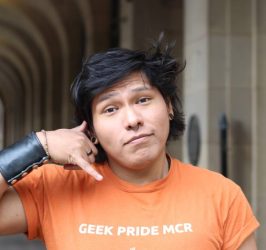Prepare a five minute talk, with up to five slides or images, in which you:
1) Sketch briefly your teaching context and other professional/creative identities (use images) –
2) Share something you learned about pedagogy and/or pedagogic research from the item you chose, and any questions it raised for you.
– Once everyone has introduced themselves, you will have the opportunity to discuss further the items you have brought with you, and your questions.

I despise power-point as it is the incarnation of teacher-centred learning pedagogies. Powerpoint embodies everything that is bad about western education IMHO. I printed the images and my work so I can retain power over it; store/dispose of them on my terms and exemplify how I – at once – met the design brief, but simultaneously subverted expectations.
It is a small way to showcase how a decolonial practice and mindset and indigenous traditions accompany me in everything I do.
The item of research I am presenting is my own published work from many years ago. I am rolling my eyes at this, and trying to be kind to myself. This was my first publication- and whilst I would do many things differently today; I must say that I have read many worse things by more senior academics than me. Have fun reading this if you are so inclined!

A think I published a while ago. Also: Please cite me, but don’t deadname me.
I will be facilitating online: Wednesday’s workshop (12 Jan, as per the timetable), the microteaching workshop day (9 Feb, all online for your tutor group), and all teaching observations and all tutorials (all online for your tutor group).
The three cohort seminars are currently scheduled to be in person (26 Jan, 23 Feb, 2 Mar) – see the timetable on Moodle here for exact locations/colleges where the sessions are taking place so you can organise your travel. (A reminder when looking at the timetable that the 9 Feb session is now online).

I made a shapeshifting dress about indigenous stories and how they can be better captured in non-textual spaces. I made an emotional exo-skeleton.

Indigenous people have voices; arrange for them to speak themselves.
Lecture on “indigenous alexa”.

Brueggemann, M.J., Strohmayer, A., Marshall, M., Birbeck, N. and Thomas, V., 2017. Reflexive practices for the future of design education: An exercise in ethno-empathy. The Design Journal, 20(sup1), pp.S1260-S1269, p.3
Vancouver
I have read worse things by more senior scholars than me; but I feel a little bit teenage angst-y about this. Anywhoo… Its there. Its out there. It exists. Nobody really cares; life goes one.

This text is making me really uncomfortable and it is important and I will dedicate the next few weeks to this and may revise my practice.

